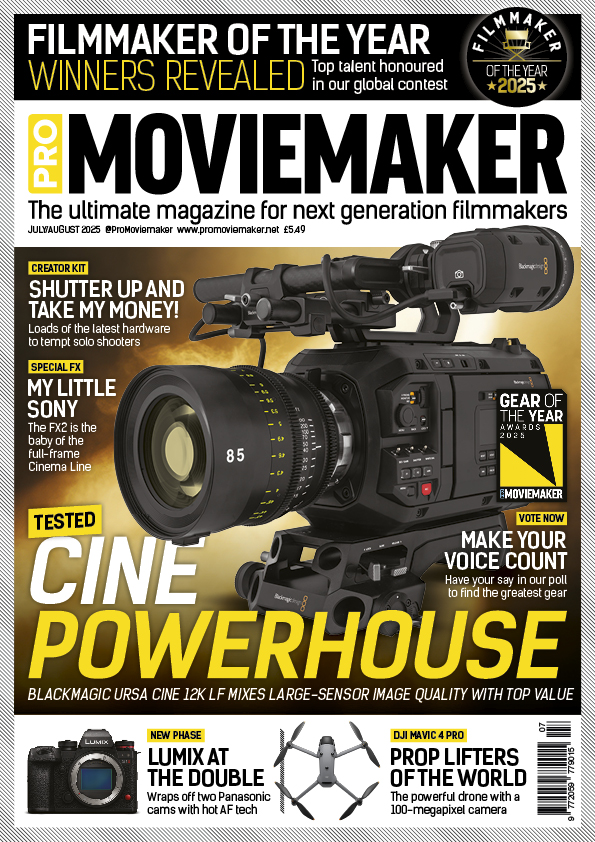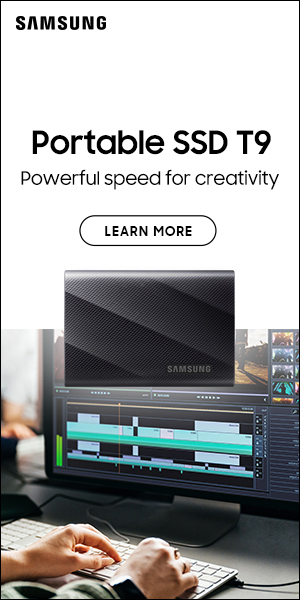
The Rise of Retro
Vintage lenses and archive content were the biggest trends in non-fiction filmmaking at the 25th Sheffield Doc/Fest…
Words and Pictures: Zena Oliani
If you want to know what’s on trend in the world of documentary filmmaking, then the Sheffield Doc/Fest is the place to be. And if you were one of the visitors who flocked from all over the world to celebrate the 25th edition of this highly-regarded festival this year, then the hottest themes were all about looking back.
The unmistakeable look of classic lenses used on modern cameras, and the mix of archive, retrospective content mixed with up-to-date footage were the big topics. What’s old is new once again, it seems.
While anyone can purchase a ticket to a screening there are certain events reserved only for full festival pass holders. Closed pitching events, panel talks with commissioners and Craft Summits are just a few of the exclusive elements to the programme and all of them were continually packed.
Notably, the Focus on Cinematography Craft Summit gave attendees the chance to hear some directors and cinematographers talk about their techniques and equipment. Directors revealed that they are regularly contacted by aspiring documentarians asking about what kit they use, so the festival was a great opportunity to talk about the considerations in choosing equipment for their own projects.
As you’d expect there’s a lot of diversity in the chosen cameras but unlike Sundance, Doc/Fest doesn’t produce a list of the most popular equipment. Anecdotally it seemed as though Canon was still leading the field years after revolutionising the market with the inconspicuous EOS 5D, with many filmmakers still using this camera or upgrading to the C-series. Capitalising on this, Canon sponsored the Craft Summit and had a stand to showcase their products particularly suited to documentary, and allow filmmakers to get hands-on with the kit.
During the cinematography Craft Summit, panel moderator Krishan Arora posed the question: “Is the choice of lens the new film stock?” But it was Maceo Frost, director of Too Beautiful: Our Right to Fight whose answer reflected a sentiment that was echoed around the festival. While he used a Blackmagic Pocket Cinema camera, he chose to pair it with vintage lenses. “Old lenses give a character to the footage, when you use new lenses sometimes it just becomes too sharp… you lose some of the personality.”



images Sheffield Doc/Fest is now in its 25th year, and attracts visitors from all over the world, growing each year by attracting new visitors as well as seasoned regulars.

During the cinematography Craft Summit, panel moderator Krishan Arora posed the question: “Is the choice of lens the new film stock?” But it was Maceo Frost, director of Too Beautiful: Our Right to Fight whose answer reflected a sentiment that was echoed around the festival.
While he used a Blackmagic Pocket Cinema camera, he chose to pair it with vintage lenses. “Old lenses give a character to the footage, when you use new lenses sometimes it just becomes too sharp… you lose some of the personality.”
Numerous other filmmakers expressed similar feelings; they’re opting for modern cameras to benefit from increased dynamic range but they don’t always want a hyper-polished final result as this can undermine the credibility of the story. The optical flaws and coatings of old glass are increasingly being employed to fabricate a more ‘real’ aesthetic.

Archiving
This theme of ‘old is new’ didn’t stop with lenses either. There was a distinct pattern of popular films at this year’s festival which had a personal retrospective element to them. In photographer Lauren Greenfield’s Generational Wealth she revisits her own shots and subjects over the past 25 years, Sandi Tan’s Shirkers sees the long lost footage of a film she shot in her youth come back into her possession and Bing Liu’s Doc Audience Award-winning Minding the Gap depicts the challenges of three young men over their decade-long friendship. This idea of significance in retrospect gave filmmakers in the audience pause for thought on their own historical content. Holly Cocker, co-director of production company Mark Three Media said “Generation Wealth definitely made us think about our own archiving and whether or not we should be revisiting some of our subjects… We do keep everything because you never know what you might need.”
Having attended the festival since 2010, Holly is a regular but she felt this year’s festival was exemplary. “It was the best I’ve seen. The location choices were more accessible, it was really well run and the volunteers were especially knowledgeable.” While Holly’s production company was too busy to be pitching this year they have pitched at previous Mini MeetMarket sessions at the festival. She said: “The pitches are a main part of the festival but even just attending drinks and socials gives you a chance to get to know commissioners. It’s amazing to be able to get together with like-minded filmmakers and see so many great films. It’s a really important festival for us.”

The Stars of The Show
Sean McAllister’s A Northern Soul was the festival’s opening night film and was well received at a typically packed-out showing but despite the prestige of this programming slot it wasn’t the most talked about screening of the festival.
That honour was saved for the UK premiere of Three Identical Strangers; as the title might suggest, this film tells the story of three men who discover at the age of 19 that they are triplets separated at birth. Blessed with the documentarian’s dream of a strong narrative arc, the film also benefitted from some behind-the-scenes insight from the director, Tim Wardle, at a masterclass preceding the screening. Tim talked about how strange it felt after 15 years of attending Doc/Fest to now be on stage and how his work in development allowed him to bide his time until the perfect directorial project came long.
“My job is generally to sift through hundreds of ideas… and work out which ones are worth pitching to the BBC, Channel 4 or whoever to make. But when you do that job you have a very high bar [for good ideas].” Tim mentioned that this story first came to him in a bare bones form through an external producer and that people had been trying – and failing – to make this film for decades. “Instantly I knew this was the single best narrative I’d ever heard and I had to make this film.” It’s no wonder that attendees descended en masse to the screening. The hosting cinema had to put on extra showings to placate the hundreds of filmmakers waiting in the standby line.

“I see people holding back because they’re not making the exact thing they want to be making”
The festival continues to grow by catering to regulars and first-time attendees like filmmaker Alexandria Bombach who flew in from the USA for a Q&A at the European Premiere of her latest film On Her Shoulders. The documentary follows the life of Nadia Murad, a Yazidi survivor of genocide and human trafficking, but focuses on why the world requires survivors and advocates to continually relive their traumas in order to provoke action.
With a number of her recent films shot in Afghanistan and Iraq, I wondered if it felt surreal for Alexandria to have those two contrasting sides to her life; shooting in war zones and going back to her normal life of attending film festivals.
“With the kind of films I do, I don’t have a life. I’m constantly travelling, I live on the road 11 months of the year,” she says. “I eat, sleep and breathe this work. So it doesn’t feel like that stark contrast… but there is a lot of sacrifice in that.”
For this project Alexandria was working solidly for 18 months. She was originally commissioned to produce a short but realised the story warranted a longer piece. “I made the film in secret for a long time; I felt that if I were to make a short film, there’d only be so much I could tell and we were the only ones with access at that time and it just would have been a waste.”
Certainly unconventional, shooting most of the film before persuading the production company that this was the film they needed had the benefit of giving Alexandria control to shape the narrative. “We didn’t tell anyone about the film until it was announced so I got to make it any way I wanted to.”

Alexandria Bombach spent 18 months on her documentary film about a genocide survivor.
While that intensity of filmmaking is a dream for some and a nightmare for others, Alexandria explained that it’s a life there for the taking. “What’s important when you’re just starting out is making sure you’re making a lot. The scariest part is when I see people holding back because they’re not making the exact thing they want to be making,” she says. “It’s just so important that you’re always shooting, because you’re growing by leaps and bounds every time you make something.”
Asked for one takeaway for Doc/Fest attendees and other aspiring documentarians, Alexandria says: “Don’t wait for anyone else to give you permission to start exploring your ideas.”
This year’s Doc/Fest programme included more than 200 projects with 37 World, 18 International, 24 European and 70 UK film premieres alongside a varied schedule of pitching sessions, talks from filmmakers and commissioners, VR/AR installations and on-demand access to films. Anyone who went to Doc/Fest would come away inspired with some technical advice to enhance their practice too. There are Q&A sessions and filmmakers linger at the end of screenings to answer questions on a one-to-one basis. If you miss the speaker at the screening there’s a good chance you’ll spot them around the city or in a bar at some point during the festival. The ticket price can be a barrier for some so if it sounds up your street get in quick; the lightning tickets for the 2019 festival are on sale from 5 July until 31 August and go for around £191. Leave it until the last minute and you could end up paying more than double that.
The next Sheffield Doc/Fest runs from 6-11 June 2019. sheffdocfest.com










